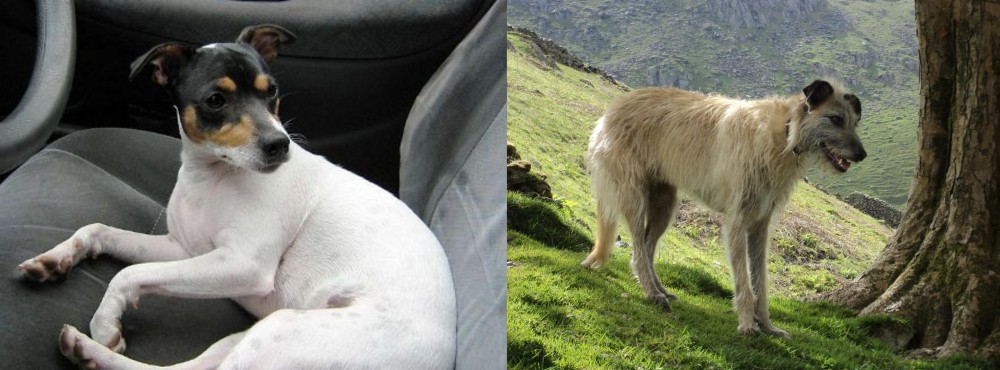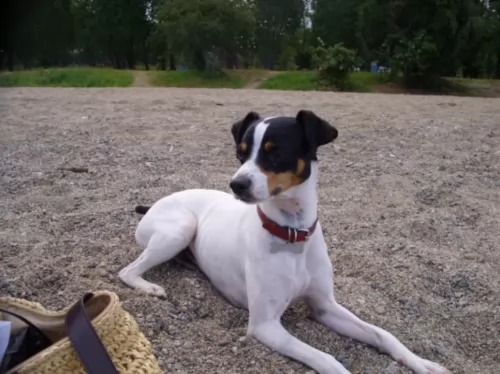 Petzlover
Petzlover Chilean Fox Terrier is originated from Chile but Lurcher is originated from United Kingdom. Chilean Fox Terrier may grow 35 cm / 13 inches shorter than Lurcher. Chilean Fox Terrier may weigh 23 kg / 50 pounds lesser than Lurcher. Both Chilean Fox Terrier and Lurcher has same life span. Chilean Fox Terrier may have less litter size than Lurcher. Both Chilean Fox Terrier and Lurcher requires Low Maintenance.
Chilean Fox Terrier is originated from Chile but Lurcher is originated from United Kingdom. Chilean Fox Terrier may grow 35 cm / 13 inches shorter than Lurcher. Chilean Fox Terrier may weigh 23 kg / 50 pounds lesser than Lurcher. Both Chilean Fox Terrier and Lurcher has same life span. Chilean Fox Terrier may have less litter size than Lurcher. Both Chilean Fox Terrier and Lurcher requires Low Maintenance.
 The Chilean Fox Terrier, developed in Chile, is a dog breed which comes from crossing the British Fox Terrier with some of the local Chilean dogs.
The Chilean Fox Terrier, developed in Chile, is a dog breed which comes from crossing the British Fox Terrier with some of the local Chilean dogs.
The dog is thought to have been developed in the 19th century already, some time between 1790 and 1850.
The dog is known for its skills in catching rats and mice. Known also as the Chilean Rat Terrier, Terrier Chileno or Ratonero, the Chilean Fox Terrier hasn’t achieved formal recognition with any of the leading canine organizations.
 The Lurcher is a crossbreed dog that doesn’t seem to have too much certainty around it. There are stories that Lurchers may have been bred to produce a sighthound with more intelligence for hunting.
The Lurcher is a crossbreed dog that doesn’t seem to have too much certainty around it. There are stories that Lurchers may have been bred to produce a sighthound with more intelligence for hunting.
Hunters discovered that breeding certain breeds with sight-hounds produced a dog better suited for hunting and working purpose.
A Lurcher is a sighthound, a classic working crossbreed and some of the dogs used to bring about this breed were Greyhounds, Deerhounds, Whippets, Border Collies, Bedlington Terriers and Irish Wofhounds among others. This means that the Lurcher has many different looks as well. In the UK, Lurchers have their own shows, but no registry recognizes the dog.
 The Chilean Fox Terrier looks almost identical to his ancestors. He stands between 30 – 40cm and weighs between 5 to 9kg.
The Chilean Fox Terrier looks almost identical to his ancestors. He stands between 30 – 40cm and weighs between 5 to 9kg.
He is squarely proportioned, he is athletic looking and well muscled with long, slender legs. Many of these dogs are born with naturally short tails, but if not, then the tail is usually docked after the first or second vertebrae. Now that docking is falling out of favor, the breed is losing that distinctive look.
The head of the Chilean Fox Terrier is triangular with the muzzle being somewhat shorter than the Smooth Fox Terrier. The ears of the Chilean Fox Terrier are smallish and high set, being partially erect. The coat of the dog is short and thick and essentially white while the face is usually tan and black.
The Chilean Fox Terrier is loyal with his human family and can fit in well with a family where there are children and other pets.
Training and socialization become necessary for the dog so that he becomes obedient and amicable around his family and with strangers. He isn’t an aggressive dog but he is alert and can make an excellent watch dog.
He is dominant and confident and also intelligent and easily trainable. He is an active dog so he will require exercise every day, whether he lives in the city or in the country.
 It is difficult to put a size and weight to the Lurcher, This is because of the many dogs used in his development, so that they vary in size and coat type. Generally though, he is a deep chested dog that stands roughly between 50 – 75cm and weighs 25 – 32kg.
It is difficult to put a size and weight to the Lurcher, This is because of the many dogs used in his development, so that they vary in size and coat type. Generally though, he is a deep chested dog that stands roughly between 50 – 75cm and weighs 25 – 32kg.
However, because Whippet was a dog used in his development, he could be as small as a Whippet, the size of a Greyhound or Deerhound.
Generally he has a shortish coat. Colours of the coat vary greatly so you can find fawn, cream, white, grey, black, tan, silver or grey and bi-colored. The ears are usually small and can be floppy or held erect or back and the tail is usually long.
The Lurcher’s temperament is much like that of the sighthound – loving and calm. It is a good idea to have the Lurcher trained and socialized to help prevent both timidity or aggression.
He is an independent and intelligent dog and can be easily trained. He is a gentle dog and will get on well with children and pets in the home as he is a fairly relaxed breed with a quiet temperament, loving to spend time with his human family. Another advantage is that he is low maintenance and makes a great pet when shown love and care.
 The Chilean Fox Terrier is a lively dog with an alert expression. He has become a popular companion dog, being less aggressive than other Terriers.
The Chilean Fox Terrier is a lively dog with an alert expression. He has become a popular companion dog, being less aggressive than other Terriers.
When you treat him well he becomes a loyal friend and forms a strong bond with his human owners. He gets on well with children who have been taught to respect animals, but he tends to become a bit aggressive around other dogs of the same sex.
Socialization and training however can make him much more relaxed around other dogs.
He is an attractive little dog with his short coat, giving the appearance of being well groomed. He can adapt to country- or city life too. He is such an easy dog to keep too so why not choose him as your 4-legged family member? He promises to make the perfect family companion.
 The Lurcher is a working- and hunting dog that won’t do well in the city, as he requires large spaces to run.
The Lurcher is a working- and hunting dog that won’t do well in the city, as he requires large spaces to run.
He is a dog that will need you to provide him with games and other activities as well as a walk every day to keep him fit and lithe. He will therefore require an owner who loves to be active and who is consistent, firm, fair, patient and kind.
With the right human family, the Lurcher is a loving, devoted dog who will make an excellent family pet.
 The Chilean Fox Terrier is a healthy breed who doesn’t appear to have any particular health issues. It doesn’t mean that your dog will be free from disease, but it is worth knowing that a quality diet, fresh water and lots of love and attention does enhance longevity in a pet.
The Chilean Fox Terrier is a healthy breed who doesn’t appear to have any particular health issues. It doesn’t mean that your dog will be free from disease, but it is worth knowing that a quality diet, fresh water and lots of love and attention does enhance longevity in a pet.
It is to your benefit to know about one or two common diseases that your dog could get.
You’ll notice your pet’s stomach being swollen. Bloat is a disease which can become dangerous because the stomach can twist. Once this happens, gas can’t escape from the stomach and your pet will want to vomit, he’ll salivate and you’ll notice unusual restless kind of behavior. You need to get him to the vet as soon as possible.
This is also a disease that any dog can develop and can be a complication of another pet disease such as Lyme disease. One of the first signs of kidney disease in dogs is drinking more often than usual and also urinating more often.
He’ll lose his appetite and be lethargic and likely lose weight. Kidney disease is a serious disease and you will need to get your pet to the vet as soon as possible.
 Every dog has the potential to develop genetic health problems, but the way you feed a dog and look after it will play a huge role in his wellbeing.
Every dog has the potential to develop genetic health problems, but the way you feed a dog and look after it will play a huge role in his wellbeing.
Lurchers are looked upon as being a pretty healthy dog breed and they can be with you for between 10 and 15 years.
Some of the main health concerns with this dog would be bloat, ear- and eye infections or heatstroke.
Remember that if you’re getting a new puppy, you can prevent some of the major life-threatening diseases by having your puppy vaccinated.
Dogs pant heavily when they’re hot. When the panting isn’t enough, the dog’s body temperature rises and this can be fatal for your pet.
The signs of heatstroke in dogs include vomiting, diarrhea, dullness and loss of consciousness. Being locked in a hot car, being over-exercised or left in a yard without shade and water can bring on heatstroke.
It is imperative to remove the dog from the hot place immediately and cool him down by spraying cold water gently over him while making sure no water enters the mouth or nose. Get him to the vet if you can because of shock and the fact that other problems could have developed.
 The Chilean Fox Terrier is a low maintenance breed and this means you won’t be having to part with any money on grooming sessions for him. He’ll basically require a brushing twice a week.
The Chilean Fox Terrier is a low maintenance breed and this means you won’t be having to part with any money on grooming sessions for him. He’ll basically require a brushing twice a week.
The Chilean Fox Terrier, as a smaller dog breed, will also require regular dental brushing, as neglecting this can result in dental problems as well as a host of diseases that are associated with gum disease and tooth decay.
Make sure to feed him a quality diet full of vitamins and minerals and ensure he always has fresh, cool water available.
 Brush your pet’s coat at least twice a week.
Brush your pet’s coat at least twice a week.
The Lurcher just loves to run and be free, so this is a dog that will want a long walk every day.
Check his eyes and inside his ears for ear infection. Find out how to clean inside the ears and make sure they are kept dry.
Keep his nails clipped, as long nails can hook and cause painful injury to the paw area. Check his teeth too and brush them because dental disease is the root cause of many other diseases.
Make sure your dog has a comfy, dry, warm place to sleep.
Encourage health and longevity by giving your pet high quality food full of vitamins and minerals. If you’re going be giving him commercially manufactured food, make sure its one of the better ones. Try and add in homemade food such as boiled chicken, brown rice and vegetables and add this to his kibble as a tasty treat. Some raw meat added in when you can afford it will also be to his advantage.